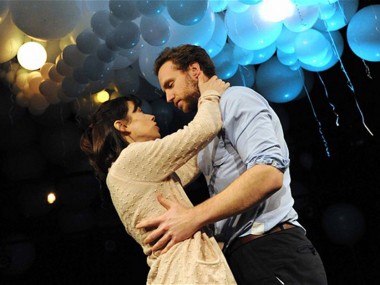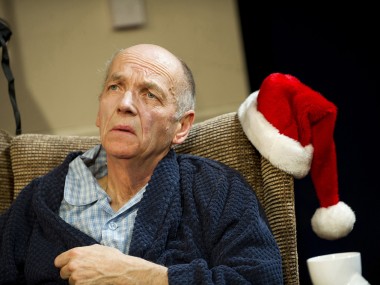The Unbelievers, Royal Court
Monday 20th October 2025

The Royal Court, Britain’s premiere new writing venue, celebrates its platinum anniversary next year — yes, it’s been 70 years since 1956’s Look Back in Anger. In anticipation, the theatre is staging two examples of new writing, one by a high-profile veteran and the other by a newcomer. The first is Nick Payne’s The Unbelievers and the other, coming next month, is Porn Play by Sophia Chetin-Leuner. Payne, whose biggest hit is the sublime Constellations, comes with high expectations, raised even further by the star casting of Nicola Walker and Paul Higgins. But can this show, by a Royal Court alumnus, fulfill the hype? Probably not.
The plot situation of The Unbelievers is simple. Middle-class 40-somethings Miriam (Walker) and David (Higgins) have three children, 20-something Nancy, 17-year-old Margaret and 15-year-old Oscar. One ordinary day, their teen son goes missing. Disappears. Despite a large police search, he is never heard of again. Nobody knows if he’s alive or dead. Payne shows what happens to this family, which includes the Reverend Karl — Miriam’s previous husband and father of Nancy — by using a fractured structure in which multiple juxtaposed scenes are set in three time periods: the first week of the disappearance, one year later and then seven years later.
Over this span of seven years, the family struggles with their loss, and with their uncertainty. This is played out through interactions with DC Elizabeth Hawkins, a family liaison officer, as well as other police; Anil and Mia, a pair of rationalist spiritualists; plus Lorraine, the new lover of David (who is separating from Miriam) and Margaret’s new boyfriend Benjamin. Plot highpoints include Miriam smashing her car window with a garden gnome, a fraught discussion about a memorial service for Oscar, a séance to summon his spirit, description of a video of a slow loris, erotic longing, and a lecture on puffins and pufflings. As you can imagine, these examples of eccentric playwriting are fun, but they come at the expense of deeper psychological exploration.
In most of the scenes Miriam behaves badly, often very badly. As a portrait of a woman devastated by grief, the drama occasionally touches, but rarely embraces the reality of a mother suffering a huge loss. At one point, Miriam goes to Beverley, at another she plans to go to Ghent, both responses to reported sightings of Oscar. The trouble is that each episode is scripted as a mix of comedy and farce, the writing often being elliptical to the point of emptiness. Okay, some moments are really strong: Miriam’s interactions with Karl, and her arguments with her daughters and her husband have the taste of cruel reality. But too often her passion is defused by comedy. The best passages express the physicality of her longing for her son, the impossibility of closure.
The play’s title obviously suggests the theme of belief. In the absence of answers, people can turn to anything that consoles. But while Miriam believes intensely that her son is alive and well and living somewhere, perhaps even in another country, she is skeptical of other belief systems, whether these are religious or spiritualist. By contrast, the rest of her family have different faiths: Karl is a vicar, of course, although a very liberal one, given to bouts of doubt, and Nancy has embraced spiritualism. While David is at first confused and then wants to move on, Margaret believes in the future. What everyone else, apart from Miriam, disbelieve is that Oscar will ever come back.
This understandable pessimism, this acute sense of having lost a family member in conditions of utter uncertainty, fractures the family. The other two siblings feel that the focus on the missing boy has made them invisible. At one point Margaret even says, “I just want my fucking mother back”, a deeply emotional moment. Briefly. Unlike many accounts of missing persons, Payne only touches on the usual speculation about what happened to Oscar: did he leave (fed up with his parents separating; bullied because he wears braces; spontaneous runaway) or was he abducted? At one point David and Miriam argue about making a public appeal on television, but a lot of the family’s pain is buried and only comes to the surface as bizarre behaviour.
Although the feeling of this story of disappearance is clear, it comes across as a series of rather unfocused questions: when does a bad incident turn into a lifetime of grief? How does a tragedy separate members of a family? What can we believe in that offers us consolation for utter loss? Payne, of course, doesn’t really engage deeply with any of this, preferring oblique comic moments, often spiced with social satire, which is both distracting and a bit silly. The fractured form of the play, and its inconclusive ending, also work to distance us from the core emotions of grieving. We never really convincingly see what’s happened to any of these individuals. Yet wouldn’t it be good to know?
Marianne Elliott’s brisk 105-minute production, designed by Bunny Christie with an open waiting-room area at the back of the stage where cast members sit out the scenes in which they are not needed, sadly serves Payne’s writing too well, mirroring his inconsistencies and unable to fine a clear enough tone. On the other hand, Walker’s central performance has a terrific energy, by turns showing Miriam as desperate, spiteful, self-justifying, abrasive, needy, imaginatively poetic, longing, and howling in agony or sneering in unpleasant condescension. As a neat contrast, Higgins is a study in bewildered pain, social anxiety, with nervy flights of ideas and a real deep-rooted anger against his wife. Alby Baldwin and Ella Lily Hyland do good work as their children, Nancy and Margaret, giving the show some much-need emotional grounding.
Likewise, Martin Marquez delivers a solid performance, mixing sense and comic sensuality, as the Reverend Karl, while Lucy Thackeray and Harry Kershaw lend Lorraine and Benjamin some brightly comic brio. Isabel Adomakoh-Young and Jaz Singh Deol are left to grapple with a couple of underwritten characters. On the press night critics were given a play text, which is normal at this venue, but also a programme, which is not. Clearly, we are being groomed to expect a West End transfer. If this does happen, I fear that audiences paying commercial prices might well be disappointed — The Unbelievers promises a lot, but withholds most of it. Am I a believer? Not really.
This review first appeared on The Theatre Times





1 Comment
on Wednesday 22nd October 2025 at 3:26 pm